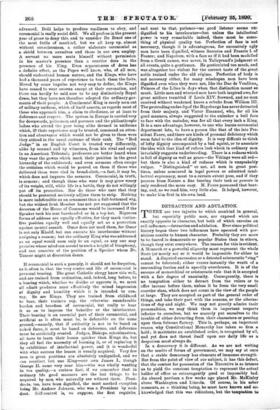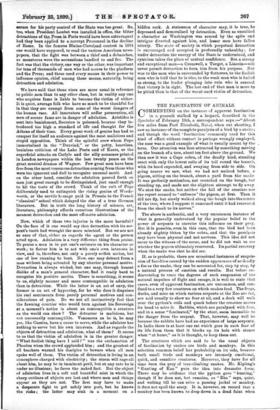DETRACTION AND ADULATION.
THERE are two injuries to which mankind in general, but especially public men, are exposed which are exactly opposite in character, but both of which exercise an evil influence,—detraction and adulation. Ever since political history began these two influences have operated with per- nicious results to human character. Probably they are more to be feared in democratic or popular States than in others, though they exist everywhere. The reason for this is evident. A Monarch or a powerful oligarchy must represent the whole State (or nearly so) or it would be impossible for either to stand. A disputed succession or a detested aristocratic "ring" cannot be tolerated; either rouses instantly the wrath of a contending faction and is speedily overthrown. It is of the essence of monarchical or aristocratic rule that it is accepted with a fair degree of unanimity. Consequently, there is no temptation either to detract from the rulers or to offer incense before them, unless it be from the very small courtier class, which does not count in the view of the people at large. They are accepted as part of the general order of things, and take their part with the seasons, or the alterna- tions of day and night. We may not greatly admire their personalities, we may think them in important respects inferior to ourselves, but we scarcely pat ourselves to the trouble of either detracting from their characters or pouring upon them fulsome flattery. This is, perhaps, an important reason why Constitutional Monarchy has taken so firm a hold ; it maintains an established order, is recognised by all, and yet does not thrust itself upon our daily life as a despotism must always do.
In a democracy it is different. As we are not writing on the merits of forms of government, we may say at once that a stable democracy has elements of immense strength. But from the point of view of our subject, it has this defect, that the contest for possession of the Executive is so intense as to yield the constant temptation to represent the actual holder of office as extravagantly good or impossibly bad. Au absurd partisan a few weeks ago placed Mr. McKinley above Washington and Lincoln. Of course, in his sober moments, as a thinking being, he must have known and ac- knowledged that this was ridiculous, but the temptation to secure for his party control of the State was too great. So, too, when President Loubet was installed in office, the bitter detractions of the Press in Paris would have been extravagant had they been applied to a corrupt Proconsul in the decline of Rome. In the famous Blaine-Cleveland contest in 1884 one would have supposed, to read the various American news- papers, that the fight was between a thief and a debanchee, so monstrous were the accusations bandied to and fro. The fact was that the victory, one way or the other, was important for tens of thousands of men who had access to the platform and the Press; and these used every means in their power to influence opinion, chief among these means, naturally, being detraction and adulation.
We have said that these vices are more usual in reference to public men than to any other class, but in reality any one who acquires fame is liable to become the victim of either. It is quiet, average folk who have so much to be thankful for in that they are exempt from some of the worst dangers of the human race. All innovators will suffer persecution, all men of secure fame are in danger of adulation. Aristides is sent into banishment, Socrates is poisoned, because they in- troduced too high a standard of life and thought for the Athens of their time. Every great work of genius has had to conquer for itself an audience against the most malicious and stupid opposition. Think of the spiteful crew whom Pope immortalised in the " Danciad," or the petty, heartless, brainless criticism of the Lake Poets and of Keats, or the superficial attacks on Carlyle and the silly nonsense printed in London newspapers within the last twenty years on the great musical dramas of Wagner. Few great men have been free from the most venomous detraction coming from those who were too ignorant and dull to recognise unusual merit. And, on the other hand, consider the adulation poured forth on men just great enough to be distinguished, just small enough to hit the taste of the crowd. Think of the cult of Pope deliberately used to extinguish the rising genius of Words- worth, or the servile homage paid in Prussia to the French "classical" school which delayed the rise of a true German literature. But in truth the long history of science, art, literature, philosophy affords countless illustrations of the meanest detraction and the most offensive adulation.
Now, which of these two injuries is the more harmful ? On the face of it one would say that detraction with its ser- pent's tooth had wrought the more mischief. But we are not so sure of that, either as regards the agent or the person acted upon. Adulation is a very different thing from praise. To praise a man is to put one's estimate on his character or work ; to flatter him is to act with one's own interests in view, and is, therefore, not only a purely selfish action, but one of low cunning to boot. Now, one may detract from a man without being actuated by any ulterior personal motive. Detraction is always wicked, but one may, through honest dislike of a man's general character, find it really hard to recognise his positive merits. There is something, it seems to us, slightly meaner and more contemptible in adulation than in detraction. While the latter is an act of envy, the former is an act of hypocrisy, for he who does it disguises his real sentiments from purely personal motives and con- siderations of gain. Do we not all instinctively feel that the fawning courtier who would turn against his Sovereign at a moment's notice is about as contemptible a creature as the world can show F The detractor is malicious, but not necessarily contemptible. Venomous as he is, he may yet, like Cassius, have a cause to serve, while the adulator has nothing to serve but his own interests. And as regards the objects of detraction and adulation, what of them ? It seems to us that the victim of adulation is in the greater danger. "What foolish thing have I said ? " was the exclamation of Phocion when the crowd applauded him ; and the greatest of all teachers warned his disciples to beware when all men spoke well of them. The victim of detraction is living in an atmosphere charged with electricity; the storm will rage all about him, he may be in imminent peril, but at any rate he is under no illusions; he faces the naked fact. But the object of adulation lives in a soft and beautiful mist in which the sharp outlines of objects are lost and where men and things appear as they are not. The first may have to make a desperate fight to get safely into port, but he knows the risks ; the latter may sink in a moment on a hidden rock. A statesman of character may, it is true, be depressed and demoralised by detraction. Even so unsullied a character as Washington was soured by the spite and intrigue directed against him, and lesser men have fallen utterly. The state of society in which perpetual detraction is encouraged and accepted is profoundly unhealthy ; for under detraction the energy of the State is undermined, and cynicism takes the place of mutual confidence. But a strong and exceptional man—a Cromwell, a Turgot, a Lincoln—will never permit detraction to turn him from his purpose. But woe to the man who is surrounded by flatterers, to the foolish man who is told that he is wise, to the weak man who is hailed as strong, to the leader plunging into ruin who is assured that victory is in sight. The last end of that man is more to be pitied than is that of the worst-used victim of detraction.







































 Previous page
Previous page